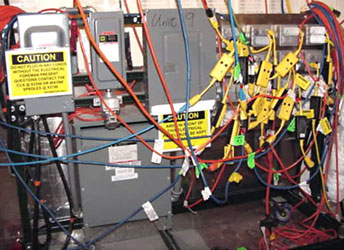Ground Fault Circuit Interrupters (GFCIs)
Although most portable electric tools have an equipment grounding conductor and many are double insulated, these methods are not foolproof. A grounding wire could break or a cord could become defective. Using a GFCI overcomes these insulation problems.

Not the proper use of GFCIs
Where GFCIs are needed:
GFCIs are required to provide approved ground-fault circuit interrupters for all 120-volt, single phase, 15- and 20-ampere receptacle outlets being used on construction sites that are not a part of the permanent wiring of the building or structure. Since extension cords are not part of the permanent wiring, any electrical tools or equipment plugged into extension cords must be protected by a GFCI device.
Insulation around flexible extension cord conductors can be damaged through hard usage or excessive wear. If the “hot” wire conductor of the extension cord were to come into contact with the grounding wire conductor, a ground fault would occur.
GFCIs should certainly be used in wet environments. When a cord connector is wet, hazardous current leakage can occur to the grounding conductor and to anyone who picks up that connector if he also provides a path to ground.
Actions you should take for electrical safety: Always make sure the tools and cords you use are in good working condition and inspect them regularly for any visible damage.
Failure in the insulation or grounding protection of your tools or cords could result in ground faults. Use GFCI devices. Take a little extra care so that you will not have a SHOCKING experience.
Protect yourself from electric shock…use safety equipment!!
Download flyer: STOTW_42_GFCI.pdf (115.56 kb)

